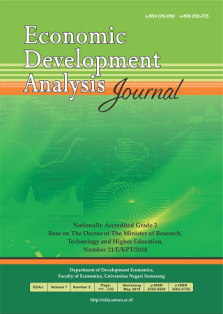Analysis of Factors Affecting Electronic Money Transactions in Indonesia
Abstract
Electronic money is money that is a new and attractive way of payment system in Indonesia. However, cashless transactions in Indonesia still lag behind other countries in the Southeast Asian region. Currently, the increase in electronic money transactions in Indonesia has not been accompanied by a decrease in banknotes. This study aims to analyze and determine the effect of destroyed banknotes / money unfit for circulation, economic growth, the amount of time deposits, credit interest rates, and the Consumer Price Index (CPI) on electronic money transactions in Indonesia. This study uses Autoregressive Distributed Lag analysis using time series data. The results show that destroyed banknotes / money unfit for circulation has a negative and significant effect to electronic money transactions in the short run and in the long run. Economic growth has a positive effect in the short run and in the long run. The amount of time deposits has an effect in the short run and in the long run. Credit interest rates have no effect in the short run but have a negative and significant effect in the long run. And the CPI does not have a significant effect both in the short and long run.


